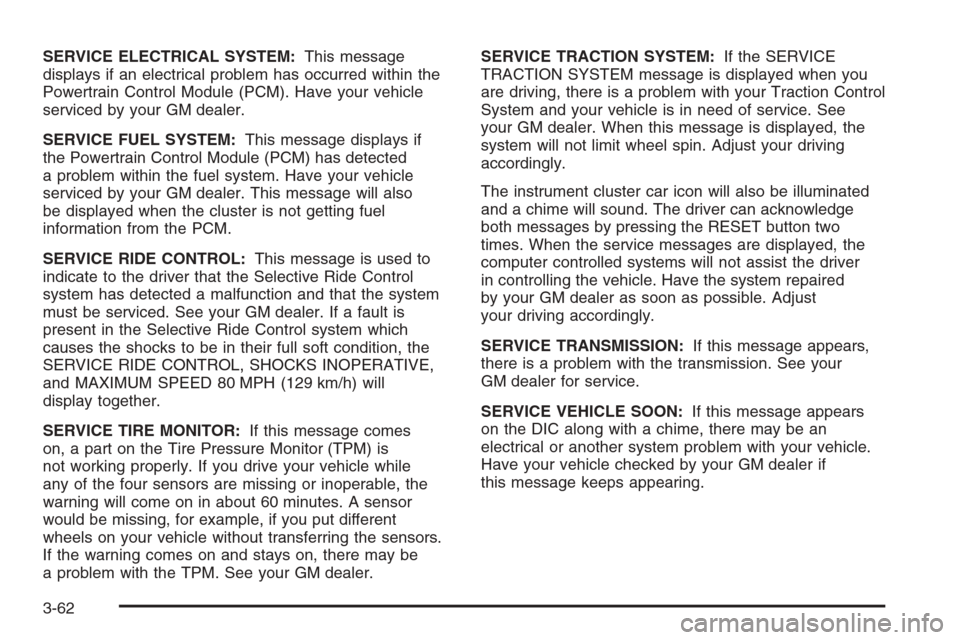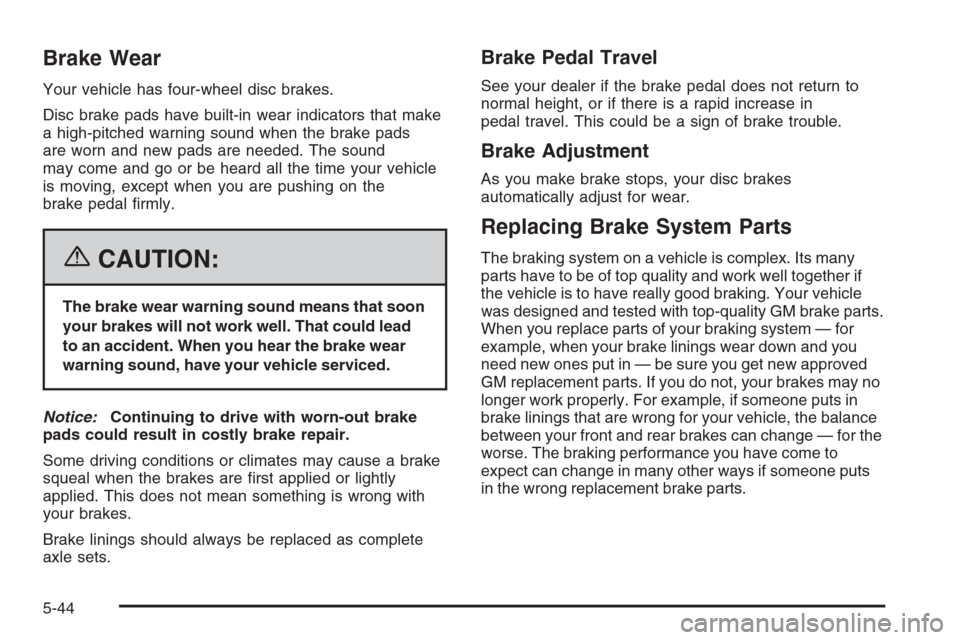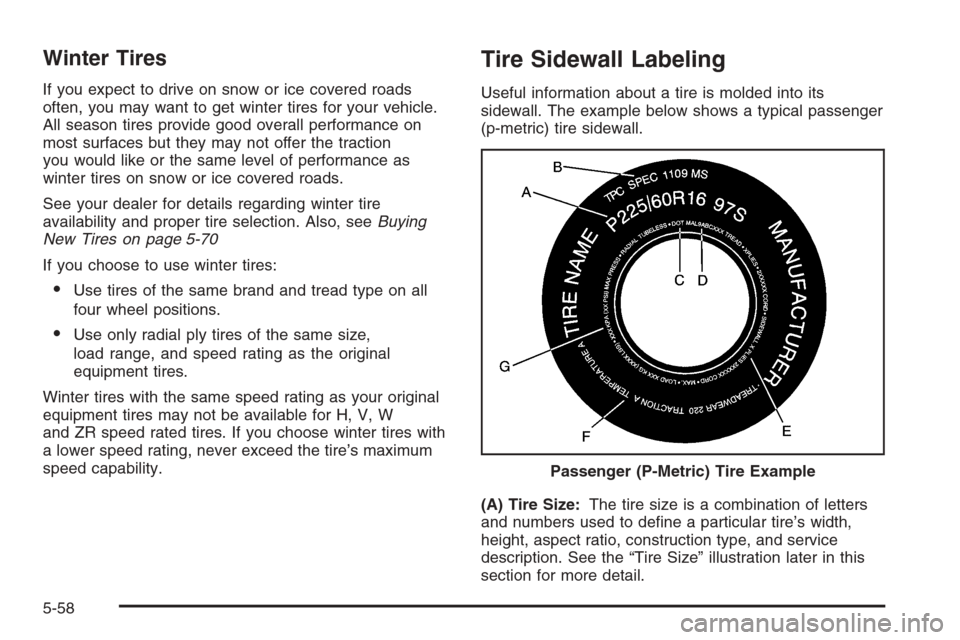Page 198 of 426

SERVICE ELECTRICAL SYSTEM:This message
displays if an electrical problem has occurred within the
Powertrain Control Module (PCM). Have your vehicle
serviced by your GM dealer.
SERVICE FUEL SYSTEM:This message displays if
the Powertrain Control Module (PCM) has detected
a problem within the fuel system. Have your vehicle
serviced by your GM dealer. This message will also
be displayed when the cluster is not getting fuel
information from the PCM.
SERVICE RIDE CONTROL:This message is used to
indicate to the driver that the Selective Ride Control
system has detected a malfunction and that the system
must be serviced. See your GM dealer. If a fault is
present in the Selective Ride Control system which
causes the shocks to be in their full soft condition, the
SERVICE RIDE CONTROL, SHOCKS INOPERATIVE,
and MAXIMUM SPEED 80 MPH (129 km/h) will
display together.
SERVICE TIRE MONITOR:If this message comes
on, a part on the Tire Pressure Monitor (TPM) is
not working properly. If you drive your vehicle while
any of the four sensors are missing or inoperable, the
warning will come on in about 60 minutes. A sensor
would be missing, for example, if you put different
wheels on your vehicle without transferring the sensors.
If the warning comes on and stays on, there may be
a problem with the TPM. See your GM dealer.SERVICE TRACTION SYSTEM:If the SERVICE
TRACTION SYSTEM message is displayed when you
are driving, there is a problem with your Traction Control
System and your vehicle is in need of service. See
your GM dealer. When this message is displayed, the
system will not limit wheel spin. Adjust your driving
accordingly.
The instrument cluster car icon will also be illuminated
and a chime will sound. The driver can acknowledge
both messages by pressing the RESET button two
times. When the service messages are displayed, the
computer controlled systems will not assist the driver
in controlling the vehicle. Have the system repaired
by your GM dealer as soon as possible. Adjust
your driving accordingly.
SERVICE TRANSMISSION:If this message appears,
there is a problem with the transmission. See your
GM dealer for service.
SERVICE VEHICLE SOON:If this message appears
on the DIC along with a chime, there may be an
electrical or another system problem with your vehicle.
Have your vehicle checked by your GM dealer if
this message keeps appearing.
3-62
Page 320 of 426

Brake Wear
Your vehicle has four-wheel disc brakes.
Disc brake pads have built-in wear indicators that make
a high-pitched warning sound when the brake pads
are worn and new pads are needed. The sound
may come and go or be heard all the time your vehicle
is moving, except when you are pushing on the
brake pedal �rmly.
{CAUTION:
The brake wear warning sound means that soon
your brakes will not work well. That could lead
to an accident. When you hear the brake wear
warning sound, have your vehicle serviced.
Notice:Continuing to drive with worn-out brake
pads could result in costly brake repair.
Some driving conditions or climates may cause a brake
squeal when the brakes are �rst applied or lightly
applied. This does not mean something is wrong with
your brakes.
Brake linings should always be replaced as complete
axle sets.
Brake Pedal Travel
See your dealer if the brake pedal does not return to
normal height, or if there is a rapid increase in
pedal travel. This could be a sign of brake trouble.
Brake Adjustment
As you make brake stops, your disc brakes
automatically adjust for wear.
Replacing Brake System Parts
The braking system on a vehicle is complex. Its many
parts have to be of top quality and work well together if
the vehicle is to have really good braking. Your vehicle
was designed and tested with top-quality GM brake parts.
When you replace parts of your braking system — for
example, when your brake linings wear down and you
need new ones put in — be sure you get new approved
GM replacement parts. If you do not, your brakes may no
longer work properly. For example, if someone puts in
brake linings that are wrong for your vehicle, the balance
between your front and rear brakes can change — for the
worse. The braking performance you have come to
expect can change in many other ways if someone puts
in the wrong replacement brake parts.
5-44
Page 334 of 426

Winter Tires
If you expect to drive on snow or ice covered roads
often, you may want to get winter tires for your vehicle.
All season tires provide good overall performance on
most surfaces but they may not offer the traction
you would like or the same level of performance as
winter tires on snow or ice covered roads.
See your dealer for details regarding winter tire
availability and proper tire selection. Also, seeBuying
New Tires on page 5-70
If you choose to use winter tires:
Use tires of the same brand and tread type on all
four wheel positions.
Use only radial ply tires of the same size,
load range, and speed rating as the original
equipment tires.
Winter tires with the same speed rating as your original
equipment tires may not be available for H, V, W
and ZR speed rated tires. If you choose winter tires with
a lower speed rating, never exceed the tire’s maximum
speed capability.
Tire Sidewall Labeling
Useful information about a tire is molded into its
sidewall. The example below shows a typical passenger
(p-metric) tire sidewall.
(A) Tire Size:The tire size is a combination of letters
and numbers used to de�ne a particular tire’s width,
height, aspect ratio, construction type, and service
description. See the “Tire Size” illustration later in this
section for more detail.Passenger (P-Metric) Tire Example
5-58